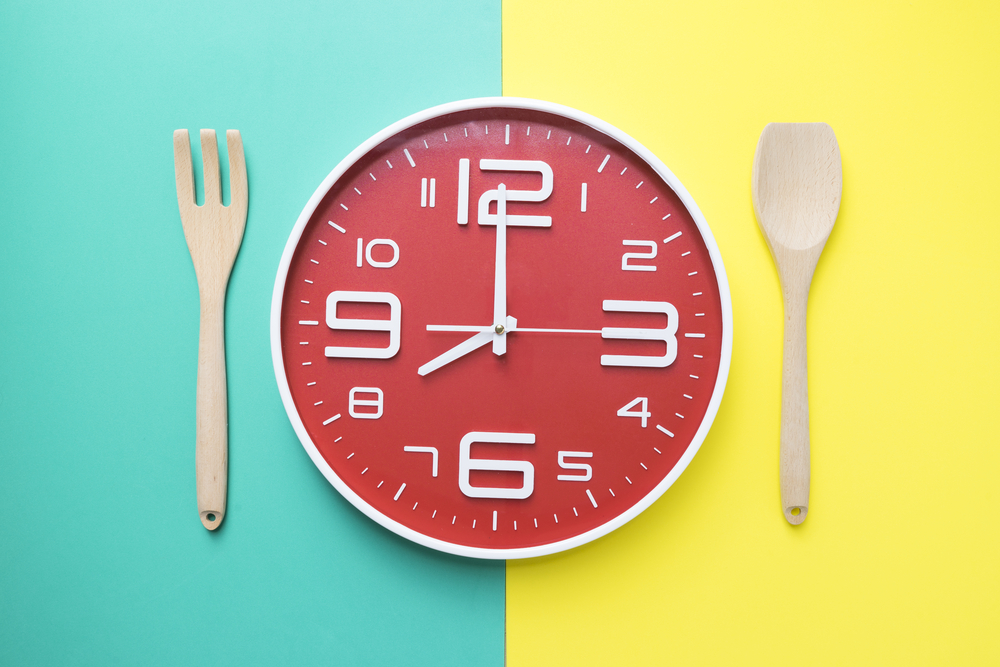Slower eating is often said to be an easy trick to lose weight. But is this actually true and does slow eating work?
So, here is what the research says:
To figure the role eating speed plays in weight loss, we first have to differentiate the two main aspects of weight loss.
First, there is the physiological aspect, which states that the calories and nutrients in food have an impact on your results. So the larger your calorie deficit the greater your weight loss. This is pretty obvious, of course.
And then there is the psychological aspect, which states that another thing that matters are your habits and lifestyle because they have a big impact on how much and what you eat, which in turn influences your calorie and nutrient intake.
The Physiological Effect Of Slow Eating
Let’s start with the physiological aspect of eating slower. Does it help your body take in fewer calories somehow?
Actually, the opposite is true. At least when you assume that people who eat slower also chew their food better.
They are studies showing that our body takes in more nutrients and energy when we chew it longer. That’s because it’s better broken down by the chewing and digestion is therefore easier.
That said, the difference is fairly small and you shouldn’t worry too much about it.
So, don’t start swallowing your food as a whole if you want to lose weight. Not only would this lead to stomach cramps, but as you will see in a second, slow eating comes with some benefits you don’t want to miss.
The bottom line in regards to physiology and calories is that if you consumed the same amount of food with the same amount of calories and nutrients eating slower would not lead to more weight loss.
It could even lead to a very minor increase in energy intake, but like I said before don’t worry about it.
The Psychological Effect Of Slow Eating
Let’s now look at the psychological impact of eating slower. This is also what most studies focus on and where you will likely see an impact.
Here is what I mean:
There are a number of studies showing that people who self-report as fast eaters tend to be heavier than those who say they eat more slowly.
Some of the studies followed the participants over years and also noticed that those who said they ate “very fast” would gain weight at a faster rate, sometimes more than twice the normal rate.
But how can this be? We just saw that if everything else is equal, eating speed doesn’t really impact calorie intake.
Well, the answer is simple. Everything else wasn’t equal. It wasn’t that the fast eating made those people overweight. It’s that the fast eating led to more overeating which made people overweight.
This happened because your appetite and therefore your calorie intake is largely controlled by hormones. When you eat your gut will release hormones telling your brain you are full. Two hormones that play a big role here are ghrelin and peptide YY (PYY).
These hormones are like messengers, letting your brain know that you’re eating and therefore taking in nutrients. The more these hormones rise the less hungry you will feel and once you feel full you stop.
What’s interesting is that this process does not happen instantly and can take a some. It differs from person to person but anywhere from 5 to 20 minutes is a rough estimate.
So if you fall on the higher end of that range your brain will need up to 20 minutes to signal that you are full.
That’s why people who eat too quickly tend to overeat as well. When their brain starts to signal that they are full they have already consumed more than enough calories.
There is one study that illustrates this perfectly. I like it because they fed participants of normal weight 300 ml (10 oz) of ice cream at two different times.
During the first session, everyone was instructed to eat the ice cream within 5 minutes. During the second session they were told to eat it within 30 minutes.
Then the scientists measured their ghrelin and Peptide YY levels, showing that eating slower led to a better response of Peptide YY than eating very fast.
While there are other studies that found no increase in satiety hormones, they did find a significant increase in fullness for slower eating.
What this means is that for most people, eating slowly will give your gut enough time to signal your brain you are full. This, in turn, will keep you from overeating and helps keep your calories in check.
Practical Advice For Better Results
In terms of practical advice you should do the following if you want to take advantage of this effect:
First, turn off distractions and don’t eat in front of the TV. Eating with friends or family is always a good thing and should be made a daily habit. If you are alone and really can’t keep yourself away from the screen, choose a 20 to 30 minute show and make your meal last the whole time.
Next, you want to always include vegetables in your meals. They are high in fiber, need a good amount of chewing but are low in calories.
And lastly, simply pay more attention to what you eat. Preparing your meals yourself and knowing what it consists of often helps people limit their food intake and keep total calories in check.
So to wrap up this post, here are the main takeaways:
– Eating slower does have weight loss benefits, which are mostly psychological and it also gives your body enough time to send out and recognize anti-hunger hormones
– But it’s not some magical hack and should always be part of a good diet and healthy eating habits



